Our versatile team is built of designers, developers and
digital marketers who all bring unique experience.

Fuel expenses are a significant cost factor for businesses that operate fleets of vehicles. As fuel prices continue to fluctuate, the need for efficient fuel management becomes increasingly crucial for maintaining profitability and reducing environmental impact. Fortunately, advancements in GPS vehicle tracking technology have introduced sophisticated fuel management systems that provide businesses with comprehensive insights into fuel consumption patterns and opportunities for optimization.
Fuel Management System: Understanding the Essentials
A fuel management system, integrated with GPS vehicle tracking, offers a comprehensive approach to monitoring and managing fuel consumption across a fleet of vehicles. It utilizes real-time data from GPS trackers installed in vehicles to gather information on fuel levels, fuel consumption rates, and vehicle idling times. This data is then analyzed and presented in user-friendly dashboards, providing fleet managers with actionable insights to make informed decisions.
Key Benefits of Implementing a Fuel Management System
1. Accurate Fuel Consumption Tracking: The system accurately tracks fuel consumption for each vehicle, enabling fleet managers to identify inefficient fuel usage patterns and address potential issues promptly.
2. Reduced Fuel Costs: By identifying and addressing inefficient driving habits, such as excessive idling and harsh acceleration, fuel consumption can be significantly reduced, leading to substantial cost savings.
3. Improved Driver Behavior: Real-time feedback on fuel consumption and idling times can encourage drivers to adopt eco-friendly driving practices, further enhancing fuel efficiency.
4. Prevention of Fuel Theft: The system can detect unauthorized fuel transactions and alert fleet managers, preventing fuel theft and misuse.
5. Optimized Route Planning: By analyzing fuel consumption data, fleet managers can optimize routes to minimize fuel usage and reduce overall travel expenses.
6. Environmental Responsibility: Efficient fuel management contributes to reducing greenhouse gas emissions, demonstrating a commitment to environmental sustainability.
Implementation and Integration
Fuel management systems can be seamlessly integrated with existing fleet management software, providing a centralized platform for managing all aspects of fleet operations. The installation process is straightforward, involving the placement of GPS trackers in vehicles and connecting them to the fuel management system.
Integrating a fuel management system with GPS vehicle tracking empowers businesses to gain control over fuel consumption, reduce costs, and improve driver behavior. The comprehensive data insights provided by these systems enable fleet managers to make informed decisions, optimize routes, and minimize environmental impact, ultimately contributing to a more sustainable and profitable fleet operation.
